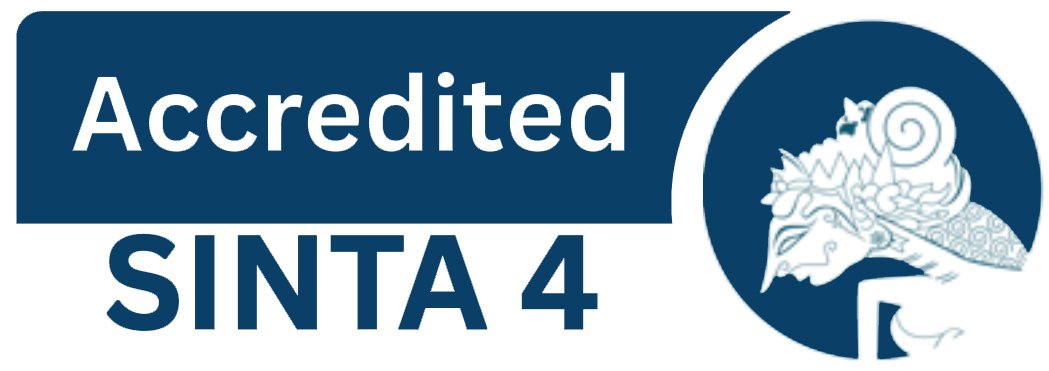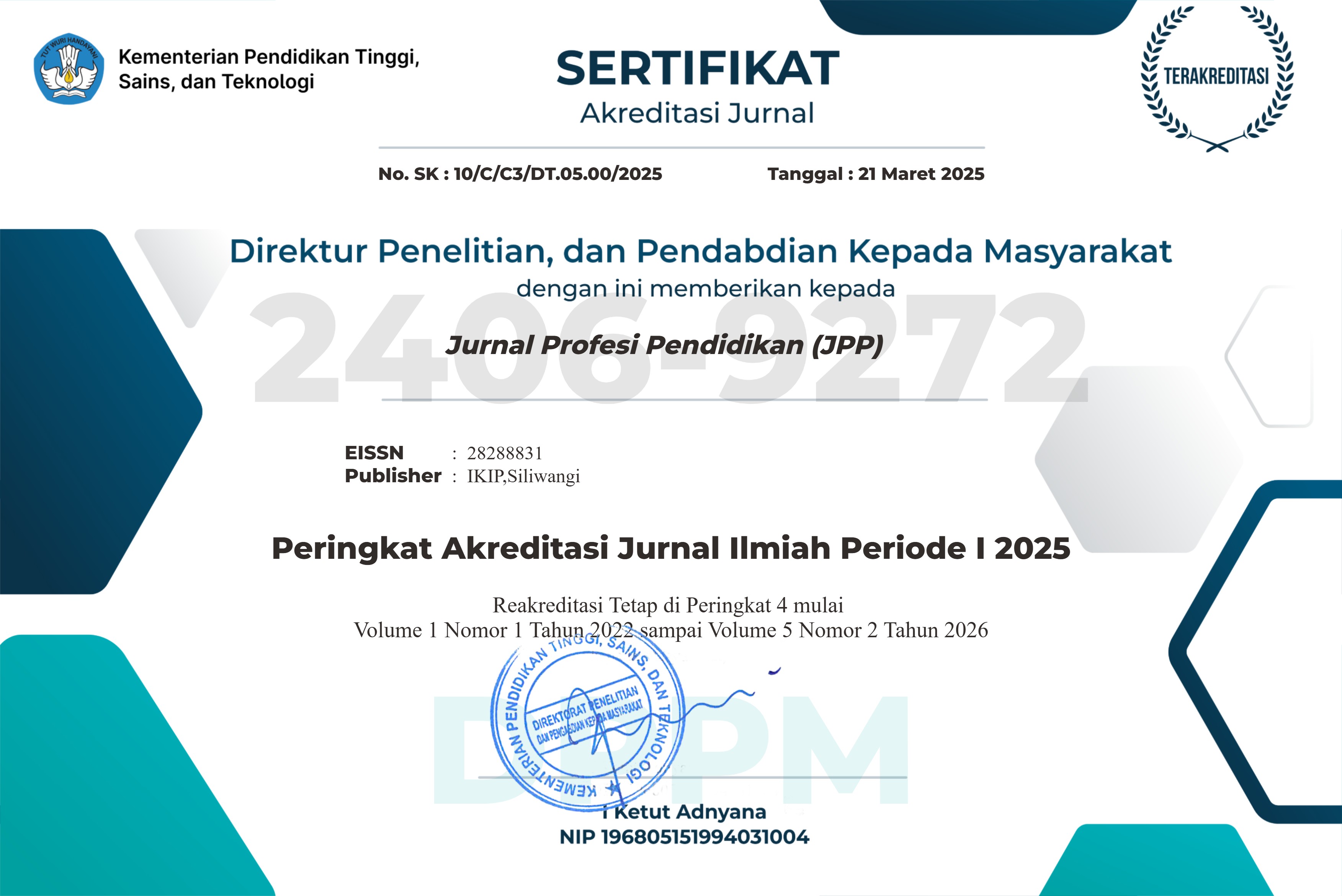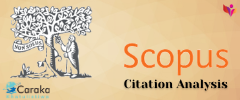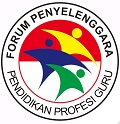Dampak Metode Pengajaran Terhadap Prestasi Siswa pada Mata Pelajaran IPS: Studi Kasus beberapa SMP Negeri di Kabupaten Tebo
DOI:
https://doi.org/10.22460/jpp.v2i1.18233Keywords:
metode pengajaran, sekolah menengah pertama, ipsAbstract
Penelitian ini bertujuan menganalisis dampak metode pengajaran terhadap prestasi siswa pada mata pelajaran IPS di SMPN Kabupaten Tebo, Indonesia. Enam sekolah menengah pertama dengan status negeri, yakni: SMPN 01, SMPN 10, SMPN 22, SMPN 24, SMPN 28, dan SMPN 46 sebagai sampel. Pada penelitian ini menggunakan 418 kuesioner diberikan kepada responden. Penelitian ini menggunakan metode studi kasus. Pada bagian analisis data menggunakan deskriptif kuantitatif berbantu SPSS 23. Hasil penelitian menunjukkan bahwa metode pengajaran ceramah paling banyak digunakan oleh guru dibandingkan yang lain (44,6%). Hasil penelitian juga mengungkapkan bahwa 31,58% siswa yang menjawab mengatakanmereka tidak mengetahui metode guru yang sebenarnyadalam mengajar mereka. Penelitian ini hanya mencakup SMP berstatus negeri yang berada di Kabupaten Tebo, provinsi Jambi, Indonesia. Hasil penelitian ini tidak dapat digeneralisasikan untuk tingkatan yang lebih luas. Disarankan untuk penelitian berikutnya mengambil responden dalam lingkup yang lebih besar seperti provinsi, ataupun negara. Manfaat penelitian ini membantu Kementerian Pendidikan yang bertanggung jawab pada pendidikan menengah dan semua pemangku kepentingan untuk memahami realitas keadaan pendidikan menengah di wilayah studi untuk meminimalisir masalah tersebut. Selain itu, penelitian ini dapat direplikasi di wilayah studi lain yang memiliki karakteristik serupa.
References
A. P., Napiorkowski, J. J., & Piotrowska, A. E. (2020). Population size in particle swarm optimization. Swarm and Evolutionary Computation, 58, 100718.
Emaliana, I. (2017). Teacher-centered or student-centered learning approach to promote learning?. Jurnal Sosial Humaniora (JSH), 10(2), 59-70.
Esra, M. E. Ş. E., & Sevilen, Ç. (2021). Factors influencing EFL students’ motivation in online learning: A qualitative case study. Journal of Educational Technology and Online Learning, 4(1), 11-22.
Fauth, B., Decristan, J., Decker, A. T., Büttner, G., Hardy, I., Klieme, E., & Kunter, M. (2019). The effects of teacher competence on student outcomes in elementary science education: The mediating role of teaching quality. Teaching and Teacher Education, 86, 102882.
Felder, R. M., Woods, D. R., Stice, J. E., & Rugarcia, A. (2000). The future of engineering education: Part 2. Teaching methods that work. Chemical engineering education, 34(1), 26-39.
Frye, C., Sayre, R., Murphy, A. B., Karagülle, D., Pippi, M., Gilbert, M., & Richards, J. W. (2023). Named Landforms of the World: A Geomorphological and Physiographic Compilation. Annals of the American Association of Geographers, 1-19.
Lambert, S. R. (2020). Do MOOCs contribute to student equity and social inclusion? A systematic review 2014–18. Computers & Education, 145, 103693.
Mandasari, B., & Wahyudin, A. Y. (2021). Flipped classroom learning model: implementation and its impact on EFL learners’ satisfaction on grammar class. Ethical Lingua: Journal of Language Teaching and Literature, 8(1), 150-158.
Serin, H. (2018). A comparison of teacher-centered and student-centered approaches in educational settings. International Journal of Social Sciences & Educational Studies, 5(1), 164-167.
Skolik, A., McClean, J. R., Mohseni, M., van der Smagt, P., & Leib, M. (2021). Layerwise learning for quantum neural networks. Quantum Machine Intelligence, 3, 1-11.
Szymkowiak, A., Melović, B., Dabić, M., Jeganathan, K., & Kundi, G. S. (2021). Information technology and Gen Z: The role of teachers, the internet, and technology in the education of young people. Technology in Society, 65, 101565.
Toro, V., Camacho-Minuche, G., Pinza-Tapia, E., & Paredes, F. (2019). The Use of the Communicative Language Teaching Approach to Improve Students' Oral Skills. English Language Teaching, 12(1), 110-118.
Turc, I., Chang, M. W., Lee, K., & Toutanova, K. (2019). Well-read students learn better: On the importance of pre-training compact models. arXiv preprint arXiv:1908.08962.
Walsh, J. E., Ballinger, T. J., Euskirchen, E. S., Hanna, E., MÃ¥rd, J., Overland, J. E., ... & Vihma, T. (2020). Extreme weather and climate events in northern areas: A review. Earth-Science Reviews, 209, 103324. 2.5.2. Klimatologi
Yuliansyah, A., & Ayu, M. (2021). The implementation of project-based assignment in online learning during covid-19. Journal of English Language Teaching and Learning, 2(1), 32-38.
Jongwon, L. E. E. (2020). Designing an inquiry-based fieldwork project for students using mobile technology and its effects on students’ experience. Review of International Geographical Education Online, 10(1 (Special Issue)), 14-39.
Mutiani, M., Supriatna, N., Wiyanarti, E., Alfisyah, A., & Abbas, E. W. (2021). Kuhnian's Paradigmatic Analysis Method As a Solution of Abstract Thinking Difficulties in Social Studies. Al-Ishlah: Jurnal Pendidikan, 13(3), 1653-1662.
Albay, E. M. (2019). Analyzing the effects of the problem solving approach to the performance and attitude of first year university students. Social Sciences & Humanities Open, 1(1), 100006.
Downloads
Published
How to Cite
Issue
Section
License
Copyright (c) 2023 Jurnal Profesi Pendidikan (JPP)

This work is licensed under a Creative Commons Attribution-ShareAlike 4.0 International License.
Authors who publish with the Journal Pendidikan Profesi (JPP) agree to the following terms:
- Authors retain copyright and grant the journal the right of first publication with the work simultaneously licensed under a Creative Commons Attribution License (CC BY-SA 4.0) that allows others to share the work with an acknowledgment of the work's authorship and initial publication in this journal.
- Authors are able to enter into separate, additional contractual arrangements for the non-exclusive distribution of the journal's published version of the work (e.g., post it to an institutional repository or publish it in a book), with an acknowledgment of its initial publication in this journal.
- Authors are permitted and encouraged to post their work online (e.g., in institutional repositories or on their website) prior to and during the submission process, as it can lead to productive exchanges, as well as earlier and greater citation of published work. (See The Effect of Open Access)
Similar Articles
- Evie Rahmawati, Latifah Latifah, Pemanfaatan Media Audio Visual dan Quizizz Pada Pembelajaran Daring Surat Pribadi dan Surat Dinas , Jurnal Profesi Pendidikan: Vol. 2 No. 2 (2023): December
- Maya Hilma Khoirunnisa, Diana Ermawati, Imada Khairunisa, Increasing Interest in Learning Mathematics Through the Technological Pedagogical and Content Knowledge (TPACK) Approach in Grade II Elementary School Students , Jurnal Profesi Pendidikan: Vol. 4 No. 1 (2025): June
- Ricke Agsela Tikuasa, Titin Supiani, Lilis Jubaedah, Pengaruh Intensitas Menonton Video Tutorial Hairdo Melalui Media Sosial Tiktok Terhadap Hasil Belajar Penataan Rambut Siswa (Studi Kasus: Siswa Student Day SMA Plus PGRI Cibinong) , Jurnal Profesi Pendidikan: Vol. 2 No. 2 (2023): December
- Siti Tazkiyah, Evi Karlina Ambarwati, Mengeksplorasi Penggunaan Strategi Metakognitif Terhadap Pemahaman Membaca Teks Berbahasa Inggris Pada Siswa SMP Di Daerah Tertinggal , Jurnal Profesi Pendidikan: Vol. 1 No. 2 (2022): December
- Lia Cristilia, Pembelajaran Berbicara Bahasa Inggris Untuk Siswa Kelas V SD Menggunakan Model Pembelajaran Kontekstual Berbantuan Media Gambar (Flash Card) , Jurnal Profesi Pendidikan: Vol. 1 No. 1 (2022): June
- Husni Qodariah, Sylvia Rabbani, Pengembangan Media Pembelajaran Ayam MSP Materi Satuan Panjang Berbantuan Aplikasi Scratch Dengan Menggunakan Model Discovery Learning Untuk Meningkatkan Pemahaman Konsep Matematika Pada Siswa SD Kelas III , Jurnal Profesi Pendidikan: Vol. 1 No. 2 (2022): December
- Fattya Rosyada, Nurul Ikhsan Karimah, Analysis of Students' Misconceptions On The Characteristics of Flat Shapes Using Two-Tier Multiple-Choice Diagnostic Test in Grade V Elementary School , Jurnal Profesi Pendidikan: Vol. 4 No. 1 (2025): June
- Siti Patimah, Jajang Bayu Kelana, Pengembangan Bahan Ajar Menggunakan Model Problem Based Learning Berbantuan Aplikasi Powerpoint untuk Meningkatkan Kemampuan Pemahaman Konsep Matematika Pada Siswa Kelas IV , Jurnal Profesi Pendidikan: Vol. 2 No. 1 (2023): June
- Riska Agni Rahayu, Ruli Setiyadi, Evi Susanti, Pengembangan Bahan Ajar Materi Laporan Wawancara dengan Menggunakan Pendekatan Open Ended Berbantuan Video untuk Meningkatkan Kemampuan Menyimak dan Menulis Kelas IV SD , Jurnal Profesi Pendidikan: Vol. 1 No. 2 (2022): December
You may also start an advanced similarity search for this article.

















